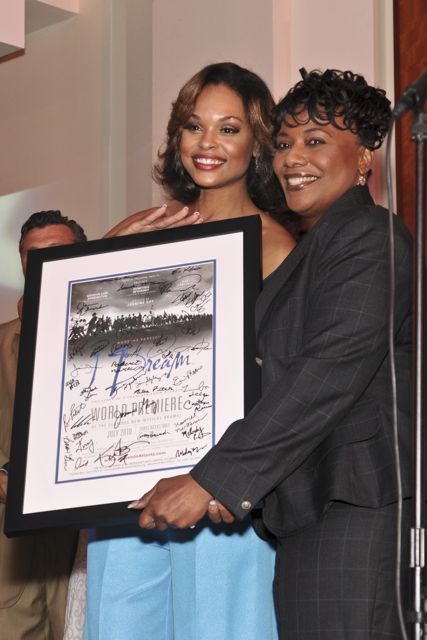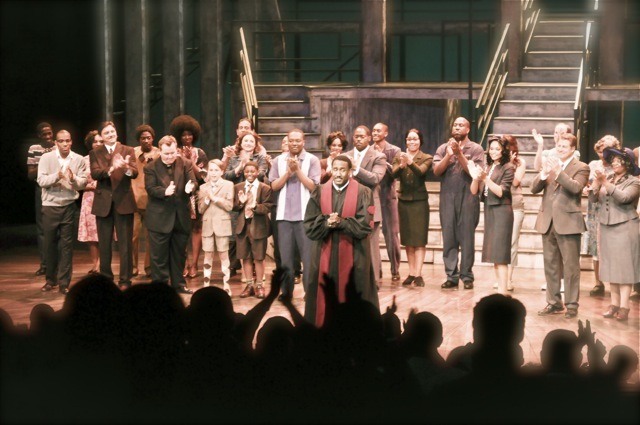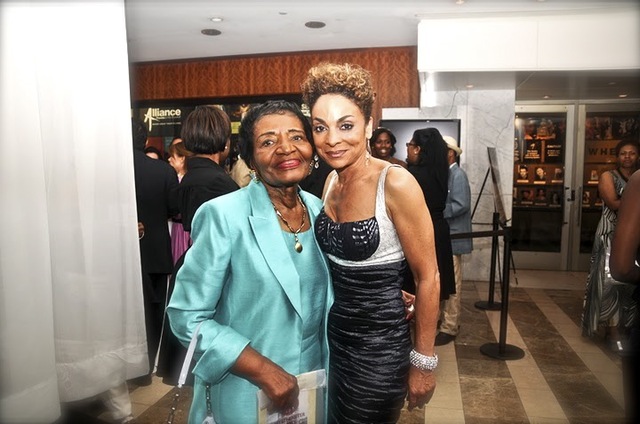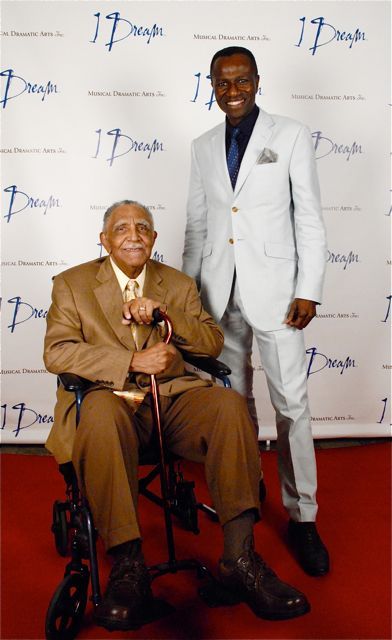ATLANTA - Giants of the Civil Rights Movement gathered Friday July 9th with members of the King family to celebrate the glittering World Premiere of the new Martin Luther King Jr. stage production, I Dream -- a modern opera based on the life of the American icon. Esteemed guests and surviving MLK lieutenants included former US ambassador Andrew Young, Rev. Dr. Joseph Lowery and Dr. C.T. Vivian) as well as Bernice King and Christine King Farris (Dr.King's eldest sister) amongst many others.
MLK's daughter, Bernice King, accepts a signed playbill from I Dream's Demetria McKinney (Coretta Scott King):
Like any worthy march, the road to opening night had been long, the travails myriad, the politics occasionally stifling. But it had been worth every step. There are indeed easier things in life than staging a theatrical production. In fact, anyone who openly expresses the intention of doing so should be calmly taken aside for a quiet word and slipped a sedative. For legend has it there are many ways to become a millionaire. The easiest of which, apparently, is to start off as a billionaire, then to produce a musical.
The I Dream story itself began a few years ago when a black English author and composer arrived in the United States with his family to start a new life. Once settled, he set himself the herculean task of writing the libretto and score for a through-composed musical drama, inspired by the life and work of the man whom President-elect Obama would famously call 'The Preacher from Atlanta', in his Grant Park speech in November 2008.
Throughout I Dream's four-year genesis, challenges emerged from every quarter. There was a lack of both theatrical and corporate appetite for yet another MLK project. Initial supporters were a scant but hardy bunch: a band of the few and the brave, determined to keep I Dream alive to ensure the velvet curtain rose proudly, with footlights ablaze, on the balmy opening night in July. As one might imagine, staging a contemporary, through-composed work is not for the faint-hearted. Particularly one comprising over 4,000 measures of glorious orchestral score, a cast of 37 performers, accompanied by 15 musicians -- especially if half the team is in London, the consulting general manager is in New York, the orchestrator is in Nashville, the composer is in Atlanta, and one of the associate producers is on Pluto.
Yet, despite the bevy of slim chances that paraded alluringly around the small team in the early stages, as producers, we eventually wedded ourselves to a July opening in Dr. King's hometown -- of all places. Initially, the usual London, New York and Washington houses all beckoned. But there was never really any doubt. We chose to go to Atlanta. Not because it would be easy, but because it would be hard. Atlanta is, after all, a City well-versed in Dr. King's life and legacy, perhaps more than any other on earth. It would offer us, at once, our warmest welcome but our toughest crowd.
Our MLK would have to prove his worth before this audience. A daunting prospect for any actor.
After an extensive search, the production finally found a 'King & Queen' to crown an extraordinary local cast. MLK would be played by the mighty Quentin Earl Darrington -- fresh from recent Broadway success as Coalhouse Walker Jr. in Ragtime. The role of his stoic and fiercely loyal wife, Coretta, would be won by Demetria McKinney, who had earned her own plaudits from her popular role in Tyler Perry's House of Payne. Together they led our tight, ambitious cast through Douglas Tappin's oeuvre on opening night with grace, power and commitment to the material and arrangements -- bringing some of the heartiest former Civil Rights activists in the house to tears, before raising them to their feet at the finale for, perhaps, the greatest standing ovation the show will ever receive.
Quentin Earl Darrington as MLK leading the inaugural I Dream cast on opening night:
Whilst many in the room could not be depicted (given the constraints of theatre), it seemed to matter little. This illustrious audience received I Dream in the spirit in which it was presented: a fresh twist on an old story and, at the very least, an instrument with which to engage a new generation with the countless individual acts of heroism and sacrifice that characterized the Civil Rights Movement.
But the inevitable question remains whether African-Americans themselves can be enticed into the theatre. Whilst Ragtime itself was not so fortunate, recent Broadway successes such as Memphis, FELA! and Denzel Washington's Fences are showing that this tide is finally beginning to turn, with the New York Times reporting African-Americans are making up some 40% of attendees at such shows. Perhaps the once-elusive African-American theatre demographic may, only now, be starting to see itself and its own history reflected back from major stages through authentic characters, credible plot-lines and relevant marketing. Broadway is, therefore, finally seeing the benefits of building a black audience. But it is not the traditional theatre critics or taste-makers driving this new trend. It is, instead, African-American Ministers, choir directors and church out-reach groups leading their own networks through the lobbies and into the worn red velvet seats.
Yet conversely, how exactly does a production, based on the life of an African-American, attract a mainstream American audience? The story of the Civil Rights Movement (1955-1968) is, after all, not solely about black history. The Movement itself (credited with creating the catalyst that would ultimately lead to the end of racial segregation in America) was not exclusively comprised of African-Americans as many would have us believe. Glenn Smiley and Al Lingo (present at the World Premiere) were but two of the many, many white Civil Rights activists who worked for freedom and equality alongside Dr. King. Equally intriguing, during this period, was the very personal ongoing battle between Rev. Martin Luther King Jr. and J. Edgar Hoover who pursued King with a fanatical zeal in a bid to ultimately discredit and neutralize him. This classic vendetta -- and its wider, national implications -- feels no less dramatic today on the stage, in concept at least, than elements of Victor Hugo's own fictional opus Les Miserables, set in 19th Century revolutionary France.
And so, arguably, the story of the Civil Rights Movement has become an American story in itself. A lesson in humanity, sacrifice and victory against all the odds. Rarely in the field of human endeavor, as Churchill put it, "have so many owed so much to so few." It is therefore not enough that we resign Dr. King to the history books, frozen in time by an untimely death and a series of monochromatic images. This would surely serve as a final injustice to all he worked for. His beliefs have yet to be called anachronistic. For as long as the eternal shadows of racism, poverty and war linger, ordinary people will always dream of brighter days ahead.
And where better, but in the theatre, to do so...
"I Dream" is the first major stage musical drama in America based on events in the life of Dr. Martin Luther King Jr. Directed by Jasmine Guy starring Quentin Darrington and Demetria McKinney. Showing on the Alliance Stage at Woodruff Arts Center, Atlanta until July 31, 2010. http://www.iDreamInAtlanta.com


